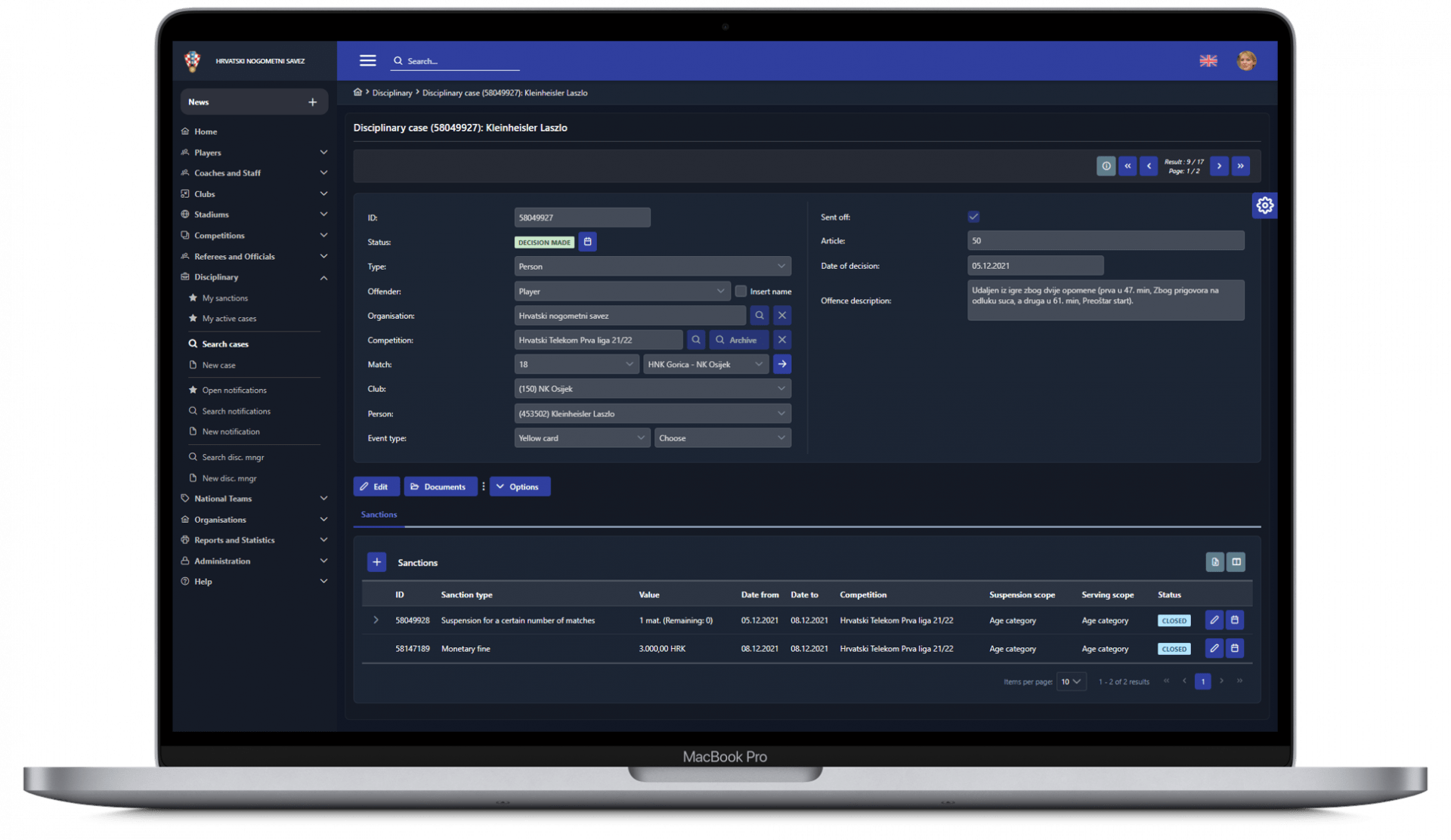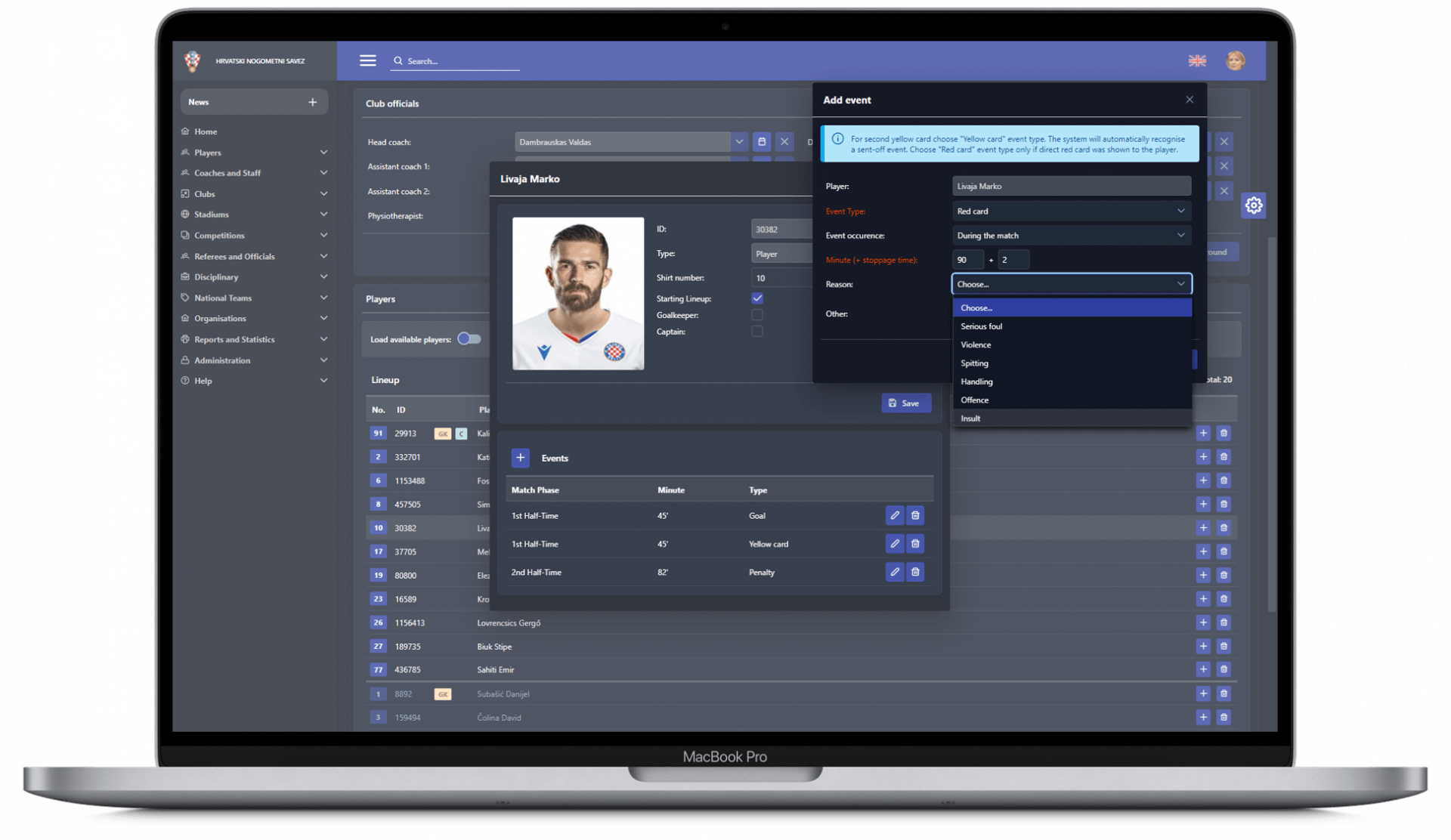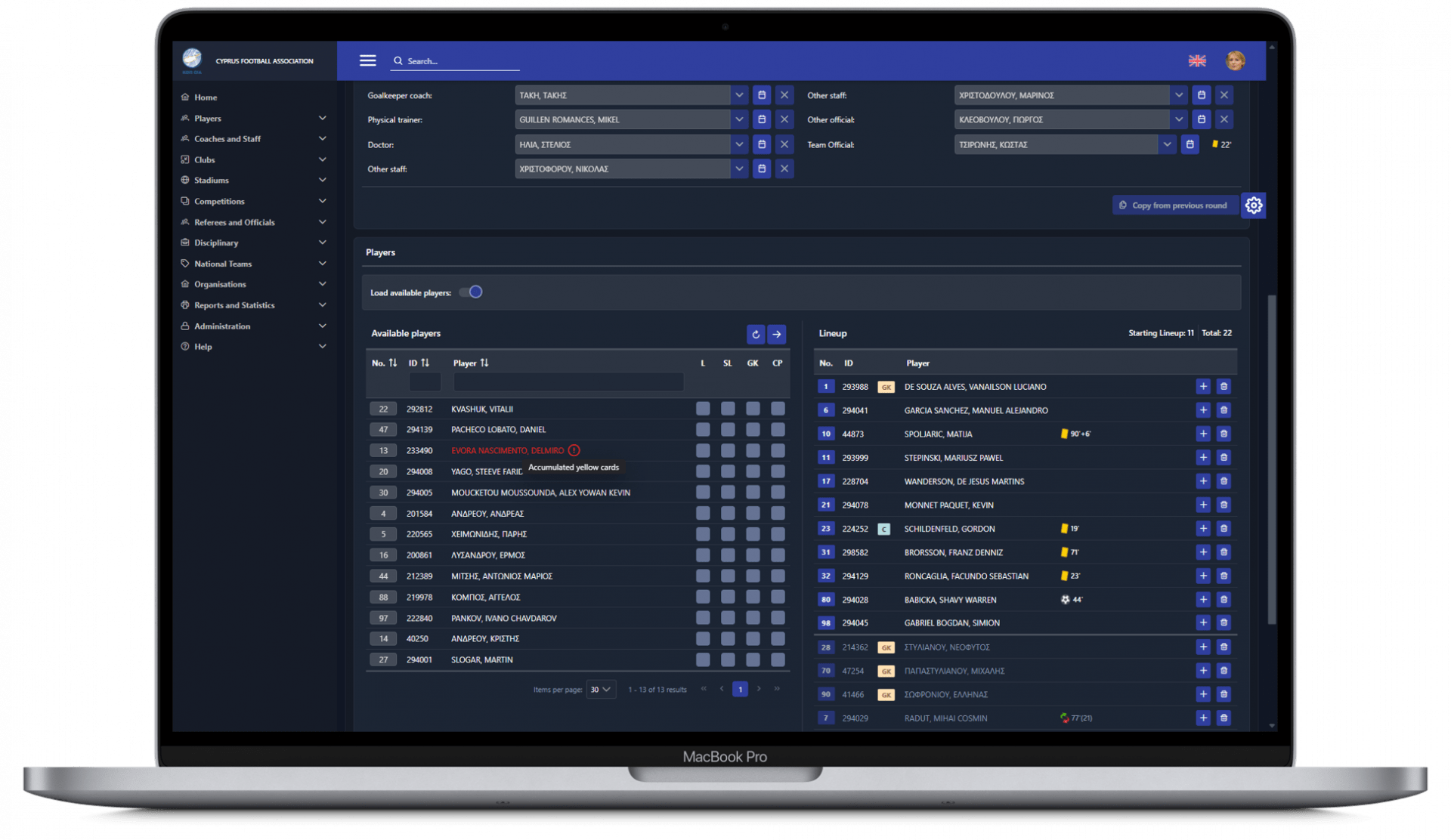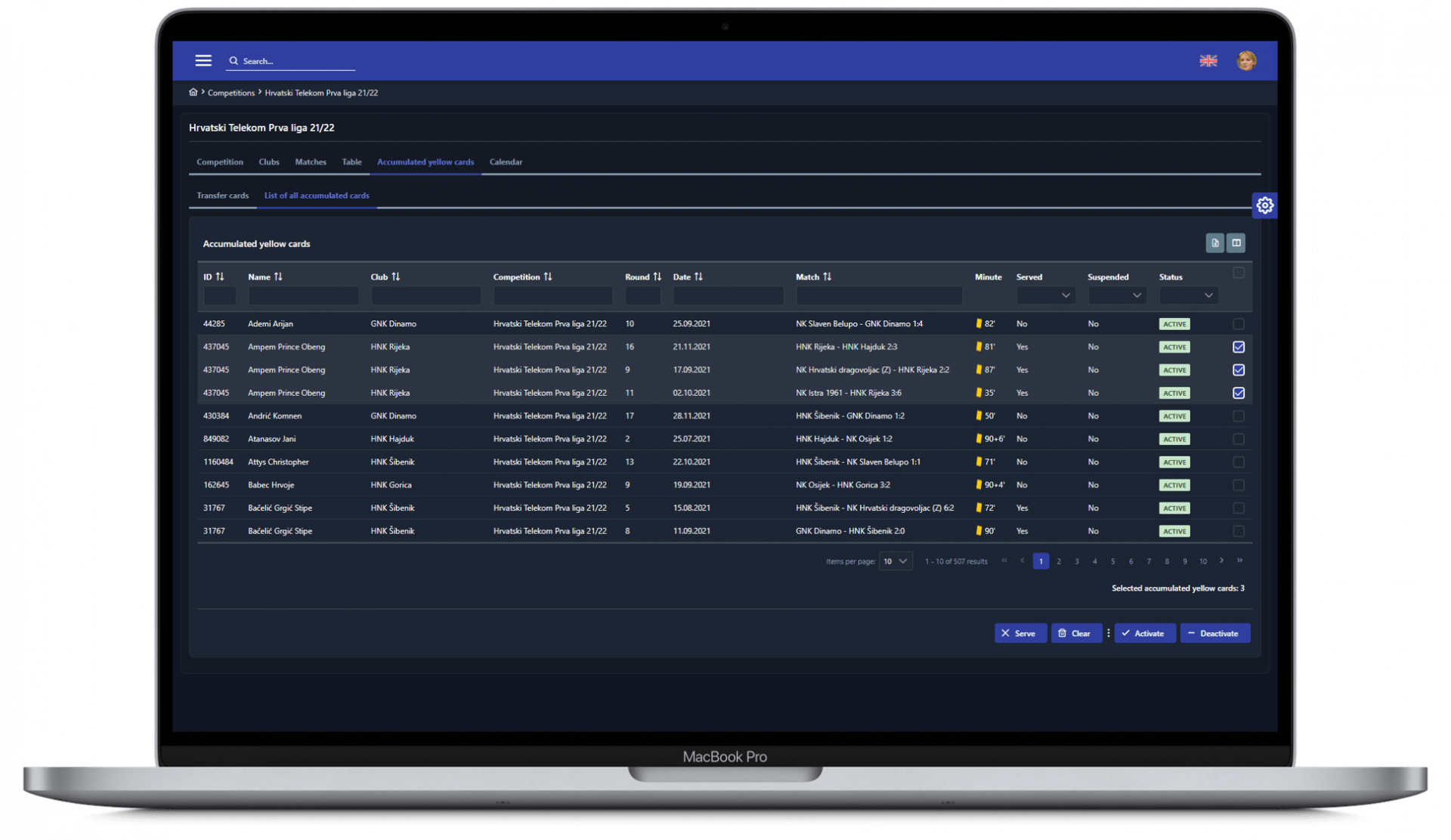DISCIPLINE
The workflow of disciplinary cases and issuance of all types of sanctions, such as monetary sanctions and match forfeits, is tightly integrated with competition management. It ensures compliance with competition regulations, prevents the participation of actively sanctioned players (or team officials), and automatically calculates served matches.
1. CASE MANAGEMENT
1.1.Case Creation
Most disciplinary cases and sanctions are created automatically, based on events on confirmed match reports, such as red cards. Beyond automated cases initiated in the course of competitions, our disciplinary module supports the manual submission of different types of „off-the-pitch“ cases and the manual assignment of sanctions. The offender can be an individual (e.g. player, coach) or an organization (e.g. club).
1.2. Consoles
List of all existing cases in the system ranked by date, organization, person, status, and other attributes allowing to filter relevant cases for review by the disciplinary body and make appropriate actions on the disciplinary case.
1.3. Resolution
Disciplinary cases hold all necessary information related to infringement, offender, type of infringement, competition if the infringement was committed during the match, and any description. All information captured in the disciplinary case helps the disciplinary body to make informed decisions and assign appropriate disciplinary sanctions to offenders.
1.4. Appeal
After the sanctions have been assigned and the case has been decided upon, the club can appeal the decision, and submit any information and upload documents to support the appeal. The disciplinary body then makes the second instance and final decision.
1.5. Articles
It is possible to categorize the cases based on articles of the Disciplinary Code of the Governing Body. After each case is assigned to an article, the association can base disciplinary reports on the articles/categories of cases and related sanctions.

2. SANCTIONS
2.1. Automatic vs Manual Assignment
Most disciplinary cases and sanctions are created automatically, based on events on confirmed match reports, such as red cards. Default sanctions depend on the type of event and offense (reason). E.g. a red card with reason=Denying Obvious Scoring Opportunity may be configured to generate a 2-match suspension and 200 EUR fine. Sanctions generated by default may be reviewed and overridden by the disciplinary bodies, e.g. in the aforementioned example, the sanctions may be manually increased to 3 matches ban and 400 EUR, due to specific circumstances.
2.2. Sanction Types
Sanction types allocated to persons range from a warning to a complete ban from football. The most common sanctions assigned to individuals/persons are monetary sanctions, suspensions for a certain number of matches and general suspensions for a period of time. The most common sanctions assigned to organizations/clubs are the deduction of points. In both cases, the confirmed sanction has an impact on the behavior of the system. E.g., the player is banned from playing until the sanctions are served, or the club has points deducted from the competition standings.
2.4. Monetary Fees
The system can automatically prevent players from playing in matches, in case of unpaid monetary sanctions. It can be configured both for automated payment collection (Sales and Payments module) and manual collection of monetary fees. For manual payment collection, consoles are provided, with an overview of paid, unpaid monetary fines, and the possibility for single/bulk closing of monetary sanctions. Grace periods can be setup, so that the offender has a defined timeframe to make the payment, before becoming ineligible to play. Payment of a monetary fee closes the sanction and restores the player’s eligibility automatically.
2.5. Match Suspensions
Match suspensions for a certain number of matches are the most common sanctions assigned to players. The system automatically restricts the player’s eligibility in a certain scope of competition and counts the matches served vs remaining. When the counter of remaining matches reaches zero, the sanction is closed and the player is eligible to play again.

3. SUSPENSION AND SERVING SCOPE
3.1. Suspension Scope
Suspension scope defines the scope of competitions where the player is ineligible to play during the suspension (e.g., only in that competition, in all competitions in that Age Category, in all competitions in that sport, etc.). For example, if a player received a red card in a U-19 match, and is banned for 3 matches with suspension scope Age Category, then that player will be banned from playing in any U-19 competition until the sanction is served. In the meanwhile, the player will be eligible to play in other categories where she/he meets the age criteria (e.g. Senior or U-17).
3.2. Serving Scope
Serving scope defines the scope of competitions where matches missed by the player will be counted as served. In the example above, the player received a red card in a U-19 match and is banned for 3 matches with serving scope Competition Type (e.g. U-19 Top Division). That means that only matches in U-19 Top Division will be counted against the 3 matches ban. After 3 rounds without appearances in U-19 Top Division, the player will be eligible to play again. Meanwhile, based on the suspension scope Age Category, the player will be ineligible to play in any U-19 competitions.
3.3. Definition
The suspension and serving scopes can be pre-defined for the entire association and apply to all competitions. However, the system provides flexibility to update the suspension and serving scopes at the individual sanction level.

4. ACCUMULATED YELLOW CARDS
4.1. Card Accumulation and Serving
The number of accumulated yellow cards required for a 1-match suspension can be defined in each competition type. E.g., when a player receives 3 yellow cards in a competition, he/she will be suspended in the following match and the club will not be able to add that player to the lineup. After the suspension has been served, the player will be eligible to play again in that competition.
4.1. Linear vs Progressive Accumulation
The number of accumulated cards can be defaulted at a country level and still overridden at the level of individual competition. E.g the value 3 represents linear accumulation and indicates that the player will be banned after 3, 6, 9 cards, etc. However, accumulation can also be progressive, which means that recidivists will be banned faster. E.g. the value 4, 3, 2 indicates that the first time in the competition, the player will need to accumulate 4 cards, then 3 cards, and then every next time 2 cards. In other words, the player will be banned after 4, 7, 9, 11, 13 cards, etc.
4.3. Card Transfer and Tracking
Competition administrators have complete insight and control of all accumulated yellow cards generated and managed within competitions. In some particular cases, such as a player joining a competition and carrying over accumulated cards from another competition outside of COMET, a manual update of the accumulated cards is required. Consoles for transferring and tracking cards allow competition managers to easily activate, deactivate, clear, add, and transfer accumulated cards across competitions.
